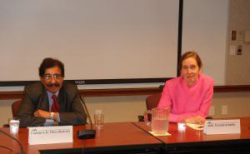IAKF Sponsors Visit of Kashmiri Politician to Washington D.C. Think Tank
IAKF sponsored the visit of Capt. S.K. Tikoo (Retired) to Washington, D.C. for the first discussion in a series on Kashmir. A meeting with Tikoo and representatives of IAKF was also arranged with the Department of State, Office of International Religious Freedom.
[Please click here to view the Washington Times coverage of this event.]
The Indo-American Kashmir Forum in conjunction with the Center for Strategic and
International Studies arranged for the first speaker in a series of discussions on Kashmir
on September 18, 2006. Ambassador Teresita Schaffer, Director, South Asia Program,
CSIS, hosted the discussion led by Capt. (Retired) S. K. Tikoo. Tikoo is the General
Secretary of the Jammu and Kashmir Awami League, a political party that has a member
in the J&K Legislative Assembly and a former Minister in the J&K Government. Tikoo
has the unique distinction of being a Kashmiri Pandit leading a party of Kashmiri
Muslims, nearly all of whom were former militants, who then fought as counterinsurgents,
and have now relinquished their weapons to join in the political process in
Kashmir.
Capt. Tikoo provided a riveting, historical account of the Kashmiri Muslim mindset and
its impact on the changing tides of Kashmiri militancy. Starting with a brief overview of
Kashmir’s history since India’s independence in 1947, Capt. Tikoo then delved into the
nature of Islam in Kashmir, including certain centuries-old practices that are exclusive to
Valley Muslims. These practices include the worship of Islamic “shrines”, the singing of
religious hymns, the reverence of “saints”, a belief in mysticism, and an overall attitude
of tolerance and peace toward other faiths. According to Tikoo, it is these traits of Islamic
practice that the Pakistani-sponsored extremists unsuccessfully attempted to abolish, and
which predictably served as the basis for the rise of counterinsurgency in Kashmir.
The insurgency was initially sparked in 1989 by an increasing amount of funding and
support from Pakistan, and which was further fueled by the indifference of Indian
politicians. However, according to Tikoo, despite these factors, the insurgency would
still not have gained a foothold without the assassination of numerous Muslim religious
leaders who had continued to insist that Kashmir’s tolerant Islamic practices should not
be forgotten.
The intrusion of the Wahabbi and other extremist forms of Islam directly attacked the
way of life for both the Hindu minority as well as the moderate Muslim majority. This
forced the Hindu minority to flee en masse, while the moderate Muslim majority
remained silent lest they, like their leaders, continue to be targeted. Tikoo also pointed
out the inherent contradictions in the insurgent uprising, which was portrayed to the
Western world as a “freedom movement” but which was locally equated with
“submission to Allah” as noted in many slogans and documents distributed by the
militants. This extremist ideology continued to gain popularity until 1993, by which time
many young Kashmiri Muslims who had received training and arms in Pakistan became
disillusioned with the militancy. Tikoo says that many of these militants eventually
realized that they were being used by Pakistan as pawns in a bigger, geopolitical game
designed to tilt the balance of power in Pakistan’s favor, without true regard for the wellbeing
of Kashmiris.
This change in ideology set the stage for what Tikoo calls the rise of “the only
spontaneous, unsponsored counterinsurgency movement the world has ever seen”. The
silent Muslim majority that had not relinquished its unique, tolerant form of Islamic faith
finally had their voice heard through a figure named Kukka Parrey, a folk singer who
took up arms and became a feared counterinsurgent. When Capt. Tikoo became involved
with Kukka Parrey’s group, he worked with them to give up violence and form a political
party, the J&K Awami League. Their party was instrumental in initiating and sustaining
the 1996 parliamentary and local legislative assembly elections in Kashmir, the first free
and fair elections held in the Valley in 6 years. Since then the Kashmiri people have
voted in many elections that have been widely regarded as free and fair. However, as the
indigenous uprising continued to wane, Pakistan’s strategy was to increase pressure by
sending foreign Islamic militants who received their training with the Taliban and al
Qaeda, beginning a new post-9/11 insurgency that relies on international terrorists whose
goal is to destroy all un-Islamic states.
Tikoo emphasized the need for U.S. diplomacy to engage those moderate Muslims who
believe in the diplomatic process rather than the Muslims who currently claim to be
leaders of the community, yet refuse to participate in elections and have not provided any
clear agenda for improving the situation in Kashmir. Tikoo requested this be approached
soon, as many of these Kashmiri Muslim voices are being silenced through targeted
killings by terrorists.
In a separate meeting at the U.S. Department of State, Tikoo held a lengthy discussion
about the lack of religious freedom in Kashmir. Tikoo emphasized the loss of pluralism
and multi-ethnic culture with the forced exodus of Kashmir’s minorities, the largest being
the Kashmiri Pandits, many of whom are still residing in ‘refugee’ camps in Jammu. He
also touched upon the difficulty for Valley Muslims to express tolerant views due to the
violence that still persists and which silences such voices. Tikoo claims the voice of
moderate Muslims needs to be encouraged by U.S. officials to help bring an end to
fundamentalist tyranny in the Valley, which he related to similar problems elsewhere in
the world. Tikoo provided contacts in Kashmir for establishing such a dialogue. Tikoo
was accompanied by IAKF representatives, who will help facilitate future meetings.






